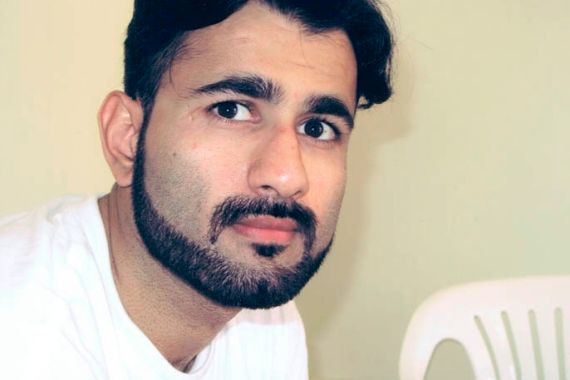In first, Guantanamo detainee details CIA torture in court
Majid Khan details being waterboarded, sexually and physically assaulted at CIA black sites during sentencing hearing.

A detainee held at the Guantanamo Bay detention centre has offered the first public account in a United States court of torture at a CIA clandestine facility during Washington’s decades-long so-called “war on terror”.
Majid Khan, a former resident of a Baltimore suburb, detailed being waterboarded, physically and sexually abused, and suffering other forms of torment at a CIA “black site”, used by the US in the wake of the September 11, 2001 attacks.
Keep reading
list of 3 itemsUS top court hears Guantanamo detainee’s ‘state secrets’ case
Judge says US held Afghan man unlawfully at Guantanamo Bay
Thursday’s testimony from Khan, which came during a war crimes tribunal sentencing hearing at the US base in Cuba, represents the first time a former “black site” detainee has publicly described abuses committed as part of the US spy agency’s so-called “enhanced interrogation techniques”, according to the New York Times.
Khan had previous pleaded guilty to charges related to his role as an al-Qaeda courier and planner.
“I thought I was going to die,” Khan said during the testimony, detailing various tortuous techniques, including being suspended naked from a ceiling beam for long periods, being doused repeatedly with ice water to keep him awake for days, and having his head held underwater to the point of near-drowning, only to have water poured into his nose and mouth when the interrogators let him up.
Khan said that during his approximately three years being held at CIA sites, he was beaten, given forced enemas, sexually assaulted and starved. He was transferred to the US military detention centre in Cuba in September 2006.
“I would beg them to stop and swear to them that I didn’t know anything,” he said. “If I had intelligence to give I would have given it already but I didn’t have anything to give.”
While some of Khan’s treatment had previously been detailed in a 2014 US Senate Intelligence Committee report – which accused the CIA of going far beyond its legal boundaries as it sought to extract information about al-Qaeda – public personal accounts from high-level detainees have been virtually non-existent.
“The more I cooperated and told them, the more I was tortured,” Khan told the court in apparent accordance with the Senate intelligence report conclusion that the conduct by US agents was not only inhumane, but often ineffective.
Rights monitors have continued to call for accountability for the abuses committed at the secret sites, with UN Special Rapporteur on torture, Nils Melzer, saying in 2017 the conduct was in “clear violation of the Convention against Torture and is sending a dangerous message of complacency and impunity to officials in the US and around the world.”
They have also increasingly urged US President Joe Biden to end indefinite detentions at Guantanamo, something his previous boss, former President Barack Obama, had vowed and failed to do.
Plea deal
Khan, reading from a 39-page statement, spoke on the first day in what is expected to be a two-day hearing. He pleaded guilty in February 2012 to charges that include conspiracy, murder and providing material support to “terrorism”.
A panel of military officers selected by a Pentagon legal official – known as a convening authority – is set to sentence Khan to between 25 and 40 years in prison. However, he will serve far less because of his extensive cooperation with US authorities, including in the case against the five men currently being held at Guantanamo who are charged with planning and providing logistical support for the 9/11 attacks.
Under the plea deal, which the jurors were not told about, Khan’s sentence by the jury will be reduced to no more than 11 years by the convening authority, and he will get credit for his time in custody since his February 2012 guilty plea.
That means he should be released early next year, resettled in a third, as yet unknown, country because he cannot return to Pakistan, where he has citizenship.
‘Tried to make up for the bad things’
Born in Saudi Arabia, Khan came to the US with his family in the 1990s. He graduated from high school in the Baltimore suburbs and held a technology job in Washington, DC, where he was working during the September 11 attacks.
He said he turned to al-Qaeda following the death of his mother, whom he described as the most important person in his life.
He has admitted to delivering $50,000 of al-Qaeda funds used for a deadly bombing of a Marriott hotel in Indonesia’s capital, Jakarta, in 2003, although he previously said he did not know how the money would be used.
The 41-year-old has also admitted to plotting other attempted attacks with alleged September 11 mastermind Khalid Sheikh Mohammed.
During the testimony, Khan asked for forgiveness for his actions, while saying he has also forgiven his captors.
“I have also tried to make up for the bad things I have done,” he said. “That’s why I pleaded guilty and cooperated with the USA government.”
The US currently holds 39 men at the detention centre on Naval Station Guantanamo Bay. Khan is the first of several so-called “high-value” detainees who went through the CIA interrogation programmes to be convicted and sentenced.
The trial of the five men in the September 11 attacks, including Khalid Sheikh Mohammed, remains in the pretrial stage and a judge has said it will start no sooner than next year.